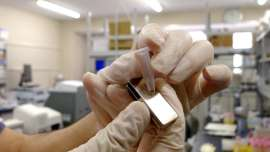
COVID-19:名古屋大学在短短4天内产生了新的电晕人工抗体
名古屋大学:研究组
当感染新的日冕病毒时,会在体内产生抗体。
名古屋大学等研究小组已成功地快速人工合成了与此类似的蛋白质。
名古屋大学的村上浩史教授和名古屋医学中心的研究小组成功地产生了抗体。
还宣布可以抑制对正常细胞的感染。
新冠病毒:
感染新的日冕病毒时
人体中会产生一种称为抗体的蛋白质,
抗体可以阻止病毒进入正常细胞,
已经有了。
人工抗体的制备:所需时间
传统方法:
过去,人工制造抗体至少要花几个星期。
这次的方法:
研究小组
来自超过10万亿个人工抗体
选择与特定病毒相关的一种,
我们已经开发了一种称为“ TRAP呈现方法”的新技术。
在短短4天内成功制作了新的冠状病毒抗体。
确认的病毒感染抑制:
另外,我们发现这次产生的人工抗体具有仅与新的电晕非常强地结合的特征。
结果,证实了病毒对细胞的感染被抑制。
重新确定结果
它将于19日在美国科学杂志“科学进步”的电子版中发表。
医疗| NHK新闻
https://www3.nhk.or.jp/news/html/20200919/k10012626211000.html
https://www3.nhk.or.jp/news/html/20200919/k10012626211000.html
捕捉新日冕的“人工抗体”:在短时间内制造方法的发展
研究团队:
研究小组准备了约10万亿种类型的人工抗体候选物,这些候选物是事先随机准备的。
带有“尖峰蛋白”:磁珠
在那里,引入了新日冕病毒表面上的“附着有突出突突蛋白的磁珠”,该磁珠用于感染人类细胞。
通过用磁铁捕获磁珠,我们捕获了与刺突蛋白结合的大量人工抗体。
从其中,选择两种结合更强的人工抗体。
过去通常要花两到三周的时间,但是花了四天的时间。
https://www.asahi.com/articles/ASN9L5V2XN9KOIPE00B.html
Fujitsu and Nagoya University Develop Technology Enabling High-Speed Detection of Toxic Proteins
Using DNA Aptamers Detects toxins 100 times faster than before, holds promise for a future free of food poisoning
Fujitsu Laboratories Ltd.,
Nagoya University Kawasaki and Nagoya, Japan, August 02, 2010
Fujitsu Laboratories Ltd. and Nagoya University
today announced the development of technology that enables high-speed detection of toxic proteins(1) that cause food poisoning.
A new sensor that detects the presence of toxic proteins was manufactured,
by employing a combination of artificial antibodies (DNA aptamers)
which capture the toxic proteins, with a signal converter which converts those “capturing events” of captured toxins into optical signals.
The new sensor
enables detection of toxic proteins 100 times faster than with previous methods.
This new technology
can be used for shipment inspections of various foods to enable faster and more accurate inspections, thus contributing to better food safety.
Fujitsu Global
https://www.fujitsu.com/global/about/resources/news/press-releases/2010/0802-01.html